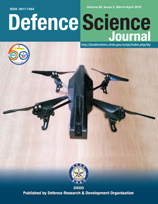A Hybrid Approach to Cognition in Radars
DOI:
https://doi.org/10.14429/dsj.68.12228Keywords:
Cognitive radar, Cognitive architecture, Artificial cognitive system, Convolutional neural network, Long short-term memory - recurrent neural networkAbstract
In many engineering domains, cognition is emerging to play vital role. Cognition will play crucial role in radar engineering as well for the development of next generation radars. In this paper, a cognitive architecture for radars is introduced, based on hybrid cognitive architectures. The paper proposes deep learning applications for integrated target classification based on high-resolution radar range profile measurements and target revisit time calculation as case studies. The proposed architecture is based on the artificial cognitive systems concepts and provides a basis for addressing cognition in radars, which is inadequately explored for radar systems. Initial experimental studies on the applicability of deep learning techniques under this approach provided promising results.Downloads
Published
2018-03-13
How to Cite
Justin Sagayaraj, M., V., J., Singh, J., Roshani, D., & Srinivasa, K. (2018). A Hybrid Approach to Cognition in Radars. Defence Science Journal, 68(2), 183–189. https://doi.org/10.14429/dsj.68.12228
Issue
Section
Electronics & Communication Systems
License
 Where otherwise noted, the Articles on this site are licensed under Creative Commons License: CC Attribution-Noncommercial-No Derivative Works 2.5 India
Where otherwise noted, the Articles on this site are licensed under Creative Commons License: CC Attribution-Noncommercial-No Derivative Works 2.5 India


